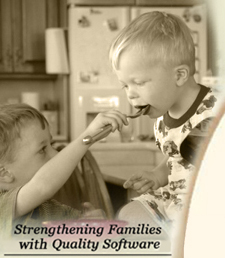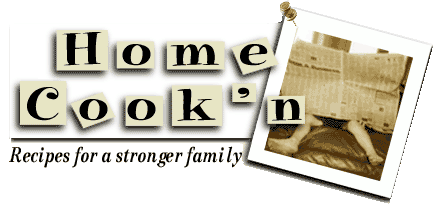|
"Is it Christmas morning now?"
My parents groaned and mumbled for us to go back to bed. My sister and I must have snuck into our parents' room at least four times that night. We were too excited to sleep, and when we did doze off, we woke up shortly after, thinking that it certainly must be Christmas now. Back to our beds and our restless dreams--waiting, waiting for Santa to arrive.
The next year, our parent's threatened, "If you get out of bed, Santa will know and he'll take all your presents away." Thus began the tradition that we couldn't come out of our rooms on Christmas morning until summoned by Mom or Dad. Each Christmas Eve, thereafter, we designated the boys' or the girls' room as the sleep-over point, sleeping bags would litter the floor, and the five of us would stay up chattering and giggling far into Santa's midnight shift.
Favorite memories abound during the holiday season. Christmas Eve meant drinking the eggnog mom brewed in the early morning of the 24th, reenacting the Nativity, eating the Stanger family's yearly offering of popcorn cake, and giving and receiving one gift for and from the person's name we drew earlier in the week.
I remember these wondrous times vividly. They continue to be what Christmas Eve means to me. I strive to pass them onto my children, blending traditions from my husband's family, and creating new magic that they'll enjoy, recall, and connect to being a Wightman.
Recently I attended a lecture on the importance of family traditions. The speaker, a student in the field of family science and a mother of eight, taught that family traditions provide the following: 1) Predictability--the structure and regularity required by successful families; 2) Connection--the emotional bond that glues families together; 3) Identity--the perception of who belongs to the family and what is unique about it; and 4) a way to enact values--the process by which members come to understand what the family believes and holds dear.
Simply, traditions strengthen our families.
The speaker often quoted William Doherty, Ph.D., a family science researcher and professor at the University of Minnesota. Author of the book, The Intentional Family (1997. New York: Addison Wesley.), he
stands by the theory that successful families don't just happen, they are planned intentionally. Dr. Doherty states that "a family, like a canoe, must be steered or paddled, or it won't take you where you want to go." Keeping traditions alive or starting new ones is one way to deliberately guide your family "canoe" in your desired direction.
Dr. Doherty defines traditions or rituals as those that mean something to the family. "To be a ritual," he states, "the activity has to have meaning or significance; otherwise it is a routine but not a ritual. The activity must also be repeated and must be coordinated."
Traditions don't just happen during holidays. Traditions can happen daily. If it is meaningful, then most likely it will be memorable. These little things--reading a bedtime story, talking as a couple, eating dinner around a table with the TV off, family prayers, leaving the porch light on for one who hasn't made it home yet--may seem routine, but they go far in promoting security, unity, and love.
 What is important to you in raising the next generation, in perpetuating your marriage, or in linking generations of grandparents and grandchildren? Are your actions consistent with those things that are significant to you? What is important to you in raising the next generation, in perpetuating your marriage, or in linking generations of grandparents and grandchildren? Are your actions consistent with those things that are significant to you?
Again, from the lecture, the speaker pointed out that the two main reasons traditions aren't perpetuated in today's families are 1) time and 2) television. If you find that your lack of time is pulling you away from your family, create a tradition, and drop one of the less vital time--consumers. If the television is running non--stop, keeping you from connecting with your loved--ones, plan a tradition. Daily, weekly, monthly, or yearly, traditions glue families together. And strong families mean strengthened neighborhoods, communities, states, nations, and potentially a stronger world. What greater contribution can you make?

|










 What is important to you in raising the next generation, in perpetuating your marriage, or in linking generations of grandparents and grandchildren? Are your actions consistent with those things that are significant to you?
What is important to you in raising the next generation, in perpetuating your marriage, or in linking generations of grandparents and grandchildren? Are your actions consistent with those things that are significant to you? 